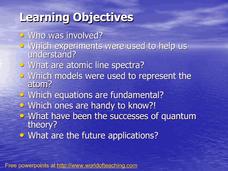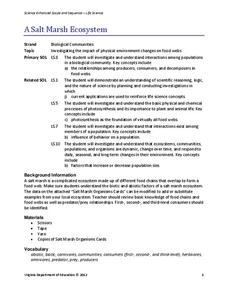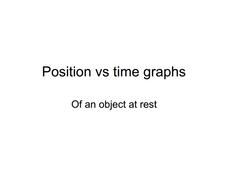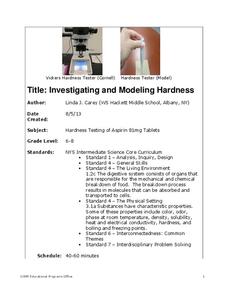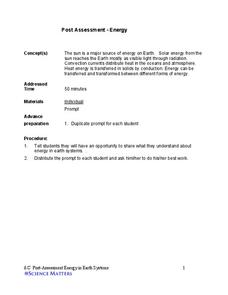Curated OER
Quantum Mechanics
Mostly what you will find here is a history of quantum mechanics. Influential scientists are introduced (along with some of their recorded quotes), the progression of atomic models is reviewed, and finally experssions and equations are...
It's About Time
The Electricity and Magnetism Connection
Magnets don't grow in fields, but magnetic fields are important to understand. The lesson covers the effect electricity has on magnetic fields. Scholars use a compass, magnets, and electrical wire to test magnetic fields and energy...
Virginia Department of Education
A Salt Marsh Ecosystem
What a web we weave. Pupils use yarn as the primary resource to create a web depicting the intricacies of a salt marsh ecosystem. They participate in a question and answer session, which leads to an in-depth facilitated discussion...
Curated OER
Position vs. Time Graphs of an Object at Rest
The presentation includes nine time vs. position graphs. The first three are meant to be used for teaching how to read them. The next three provide an opportunity for students to practice reading them, while the last three display the...
Curated OER
A Hilly Ride
Different types of energy are the focus of this science resource. Learners identify situations in which kinetic and potential energy are exchanged. They conduct an in-class inquiry which leads them to discover that there is a limit to...
Cornell University
Investigating and Modeling Hardness
Model hardness testing with a self-designed hardness test. Young scholars rate the hardness of different types of aspirin using the Vicker's Hardness scale. They then relate hardness to the solubility of each aspirin tablet.
NOAA
The Oceanographic Yo-yo
How does chemistry help deep-sea explorers? Part four of a five-part series of lessons from aboard the Okeanos Explorer introduces middle school scientists to technologies used in ocean exploration. Groups work together to analyze data...
Curated OER
Spectral Lines
Slides and slides of emission spectra bring this topic to light for your physics class! Exited electrons returning to lower energy levels is offered as the cause of emission spectra. In summary, viewers learn that we can determine the...
Star Date
Shadow Play
Three activities make up a solar system lesson that features the sun, its light, and the shadows it produces. Scholars step outside to discover the changes shadows make at different times of day, take part in a demonstration of...
Science Matters
Post-Assessment Energy
After nine lessons and activities about energy, here is the final assessment. The 20-questions include multiple choice, multiple choice with justification, short answer, answer analysis, and labeling diagrams to challenge learners.
CK-12 Foundation
Bow and Arrow
Where does the energy of an arrow come from? Is it from the person, the bow, or somewhere else? A simulation allows scholars to adjust the stretch distance and the elastic constant in order to understand where the energy comes from, what...
CK-12 Foundation
Phases of the Moon
The sun can tell us what time it is with a sun dial, but can the moon do the same? Scholars play with a simulation of the phases of the moon. They control the type of moon and time of day in order to see when the sun is up and when the...
CK-12 Foundation
Cannon Simulation
Fire in the hole! Thrill your classes as they see what it's like to fire a cannon ball. Scholars practice aiming a cannon ball by altering first the firing angle, then the velocity, and finally both simultaneously. Can they discover the...
Curated OER
F = ma, Inertia, and Action-Reaction
Fourth graders apply concepts of Newton's Laws in scientific inquiries. Use this activity to have your charges test and identify the characteristics of objects that make them easier or harder to push. After a teacher-led demonstration,...
Curated OER
The Left Hand Rule (For Motors)
The left hand rule, also known as Fleming's rule, is covered here with explanations and pictures to help undertanding. Examples of electric motors and generator use are given. A helpful set of slides which will help early physics...
Virginia Department of Education
Mineral Identification
What's the difference between a rock and a mineral? And what properties are used to identify minerals? The first installment of a five-part series on earth materials and processes prompts young scientists to identify a set of...
NASA
Melting Ice: Designing an Experiment
Sometimes, despite the best laid plans, the unexpected will occur. Learners witness this firsthand as they carefully design an experiment to determine the time needed for ice to melt in salt water or pure water. They uncover facts not...
CK-12 Foundation
Rose Colored Glasses
How can we change the color of what we are seeing? The simulation allows individuals to change the color of a car's paint, the color of light pointed at the car, and the color of glasses the person is wearing. Each combination creates a...
CK-12 Foundation
Telegraph
Most pupils don't know what a telegraph is, much less how one works. A secret simulation has scholars pick the size of the primary and secondary loops, the battery voltage, and which letters in the Morse Code they want to transmit. They...
CK-12 Foundation
Subatomic Particle Zoo
Everything is made up of atoms, but what are atoms made up of? The simulation explores subatomic particles. It focuses on hadron, boson, and lepton groupings as scholars learn about quarks, neutrinos, gluons, and more.
CK-12 Foundation
Oscillations Simulation
What makes a swing go back and forth like a pendulum rather than going all the way around? Scholars use the simulation to explore pendulums and how they work. They vary the weight, length of the rope, and even gravity in various trials.
Institute of Electrical and Electronics Engineers
Be a Scanning Probe Microscope
Extensive reading is done in order to learn about scanning probe microscopy and nanoscale. Afterward, individuals use a pencil to probe an unidentified object that is inside of a box so that they cannot see it. Using only what they could...
Curated OER
Force Problems
Who knew F=MA could determine the force of a free-falling elevator? Give your class this set of thirteen word problems for practice determining force, mass, and acceleration of everyday objects. One question introduces an object in...
Virginia Department of Education
The Cycles of Nature
Encourage peer collaboration and assist with the creation of visual aids to identify carbon, water, and nitrogen cycles as your class learns more about nature. They discuss relative information, create a visual aid...
